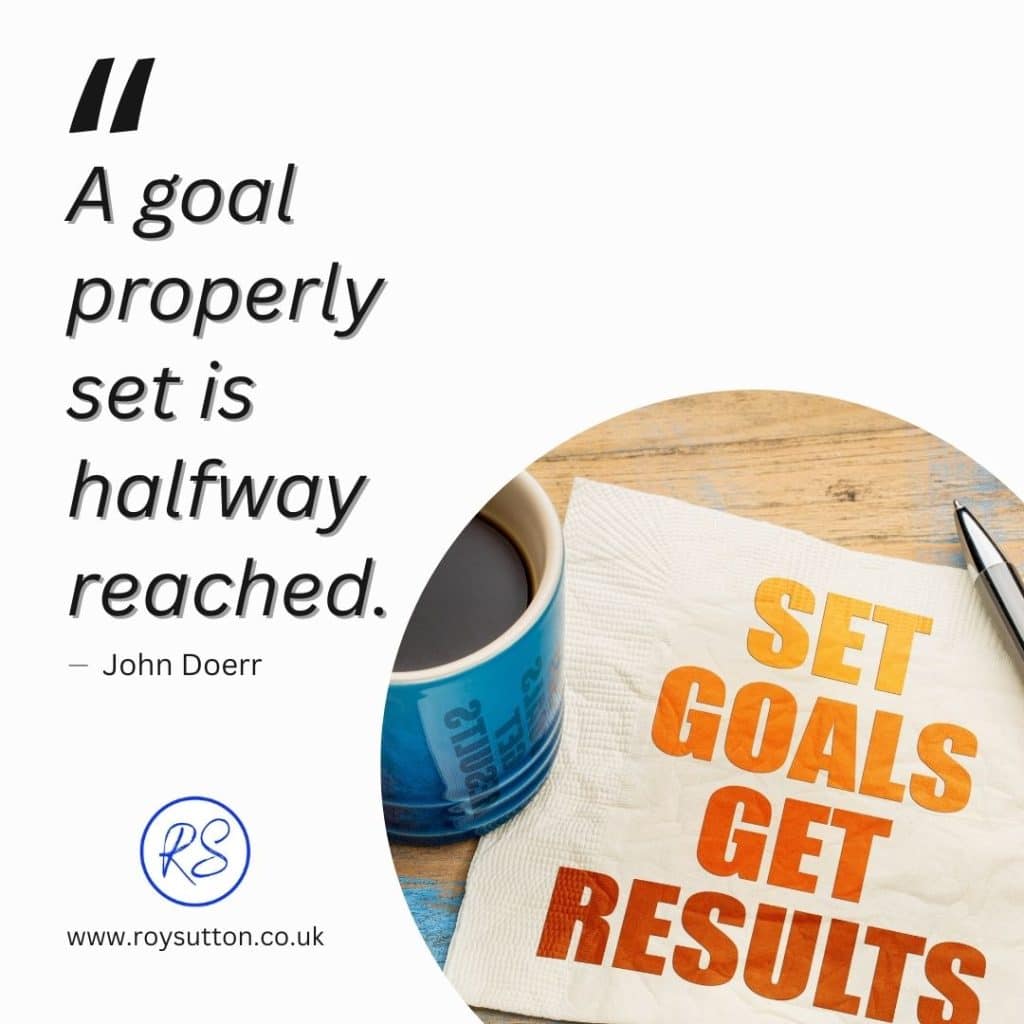
If you’re looking for quotes about goals in life to inspire you, look no further, dear reader. There are some great quotes here today.
Having goals matters.
If you don’t have something at which to aim, then you’re sure to miss it every time.
So, decide what you want to achieve; decide what actions you’ll need to take to achieve it, and then set some challenging goals.
Work towards specific goals, and you’ll go from being ordinary to being extraordinary.
So set some goals now, but not before you’ve been inspired by all these great quotes that I’ve curated for you today. Enjoy them all.

Quotes about goals in life (1-15):
- If you aim at nothing, you will hit it every time. ~Zig Ziglar
- Set your goals high, and don’t stop till you get there. ~Bo Jackson
- Mastering others is strength. Mastering yourself is true power. ~Lao Tzu
- You are never too old to set another goal or to dream a new dream. ~CS Lewis
- Shoot for the moon. Even if you miss, you’ll land among the stars. ~Les Brown
- Setting goals is the first step in turning the invisible into the visible. ~Tony Robbins
- One way to keep momentum going is to have constantly greater goals. ~Michael Korda
- Obstacles are those frightful things you see when you take your eyes off your goal. ~Henry Ford
- If you don’t know where you’re going, you’ll probably end up somewhere else. ~Lawrence J. Peter
- I don’t focus on what I’m up against. I focus on my goals and I try to ignore the rest. ~Venus Williams
- A goal is not always meant to be reached; it often serves simply as something to aim at. ~Bruce Lee
- The trouble with not having a goal is that you can spend your life running up and down the field and never score. ~Bill Copeland
- You must take action now that will move you towards your goals. Develop a sense of urgency in your life. ~H. Jackson Brown, Jr.
- If you’re bored with life – you don’t get up every morning with a burning desire to do things – you don’t have enough goals. ~Lou Holtz
- The great danger for most of us lies not in setting our aim too high and falling short, but in setting our aim too low and achieving our mark. ~Michelangelo
Quotes about goals in life (16-21):
- The game has its ups and downs, but you can never lose focus of your individual goals and you can’t let yourself be beaten because of a lack of effort. ~Michael Jordan
- Never quit. It is the easiest cop-out in the world. Set a goal and don’t quit until you attain it. When you do attain it, set another goal, and don’t quit until you reach it. Never quit. ~Bear Bryant
- Our goals can only be reached through a vehicle of a plan, in which we must fervently believe, and upon which we must vigorously act. There is no other route to success. ~Pablo Picasso
- When it is obvious that the goals cannot be reached, don’t adjust the goals, adjust the action steps. Confucius Stay focused, go after your dreams and keep moving toward your goals. ~LL Cool J
- Everyone has a purpose in life and a unique talent to give to others. And when we blend this unique talent with service to others, we experience the ecstasy and exultation of our own spirit, which is the ultimate goal of all goals. ~Kallam Anji Reddy
- Successful people maintain a positive focus in life no matter what is going on around them. They stay focused on their past successes rather than their past failures, and on the next action steps, they need to take to get them closer to the fulfilment of their goals rather than all the other distractions that life presents to them. ~Jack Canfield

Please share these quotes with your friends:
If you found these quotes inspiring and interesting, please share this post on social media with your friends. When you share, everyone wins.
So go on, please share this post now. If you do, I’ll be ever so grateful, and you’ll be helping a keen blogger reach a wider audience.
Thank you for your support.
Articles that might appeal to you:
- 7 quotes about technology and why we must control it
- 25 amusing quotes about getting old to tickle you
- 11 funny quotes about money to make you smile
- 31 funny puns that are very cheesy but very amusing
- 29 clever puns that’ll make you smile, at least a little
- 25 funny witty quotes that will seriously tickle you
- 15 Very Funny One-Liners by Billy Connolly
- 35 witty one-liners that are all very corny but fun too
- 37 funny comebacks for dealing with rude people
- 21 witty short jokes to tickle you and brighten your day
- The 30 best bitchy comments that’ll really make you smile
- 31 stupid quotes that make no sense that’ll make you think
- 25 corny puns that’ll make you smile or make you cringe
- 31 great quotes from Larry David in Curb Your Enthusiasm
- 21 Del Boy quotes fans of Only Fools and Horses will love
- 50 Funny footballer quotes for soccer fans everywhere
- 15 amusing quotes by Jerry Seinfeld to brighten your day
- 21 funny computer nerd jokes that will tickle you
© Mann Island Media Limited 2026. All rights reserved.








